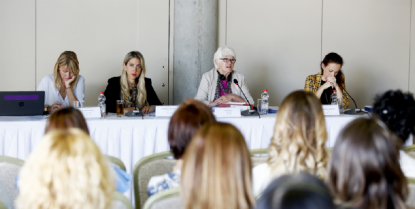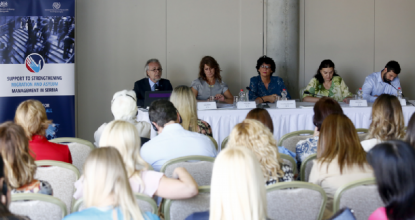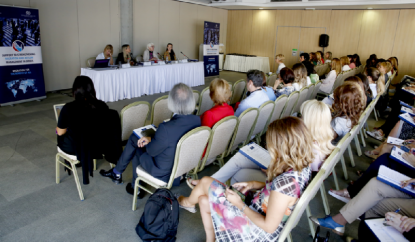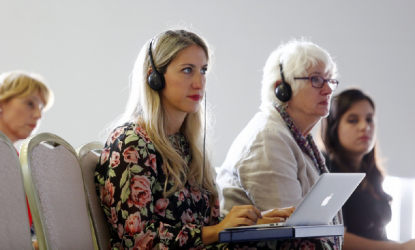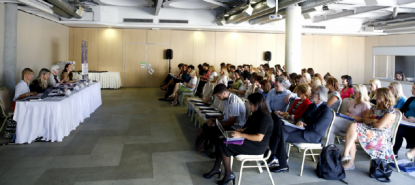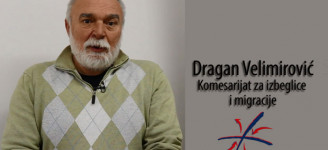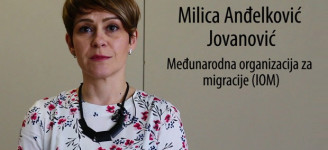Conference "Novelties in the Asylum and Migration System in the Republic of Serbia and Challenges in their Application"
The conference consisted of three panels. The first one was dedicated to novelties in the field of asylum in Europe, the reform of the Common European Asylum System, the latest case law of the European Court of Human Rights and the challenges in respecting these standards in the Republic of Serbia. The second panel treated the novelties in the asylum system in the Republic of Serbia and the new Law on Asylum and Temporary Protection, while the third panel was dedicated to novelties in the legislative framework in the field of asylum and migration with a special accent on the novelties in the Law on Foreigners that will be applied as from the beginning of October this year.
The participants were greeted by representatives of the International Organization for Migration (IOM), the British Embassy in Serbia and the AIRE Centre. In addition to welcoming words, also statements of some of the key speakers at the conference are presented here.
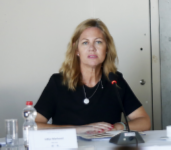 Donatela Bradić, Regional Project Manager at IOM Serbia, opened the conference and thanked the British Embassy in Serbia without which there would be no continuation of the project "Support to Strengthening Migration and Asylum Management in Serbia".
Donatela Bradić, Regional Project Manager at IOM Serbia, opened the conference and thanked the British Embassy in Serbia without which there would be no continuation of the project "Support to Strengthening Migration and Asylum Management in Serbia".
"The most important results of the previous phase of the Project include the establishment of a Migration Training Centre and cooperation with the AIRE Centre, which was crucial for the development of the ‘Handbook on Protecting Migrants in the Republic of Serbia’. They have provided us key expert assistance in the field of migration management, and I must mention the synergy of national and European partners and agencies that have made great efforts in the first phase of the Project. "
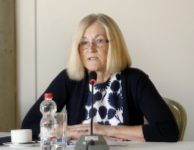 Tracy Gallanger, Deputy Head of Mission at the British Embassy in Serbia, emphasized the importance of proper migration management.
Tracy Gallanger, Deputy Head of Mission at the British Embassy in Serbia, emphasized the importance of proper migration management.
"We have recognized the importance of development in this area and we believe that it is very important to ensure full respect for human dignity along with continuous care of proper migration management. It is extremely important to pay attention to the issue of security and problems of beneficiaries who need our support. We are happy to have a global fund for responding to these challenges and problems. It is critical that a wide range of actors take part in the implementation of the Project and that they are all continuously engaged in different activities based on the needs of those who require assistance. I expect the Project to support the direct application of the law, and I believe it will. "

"One of the most important features of this Project is the strengthening of domestic capacities. During the previous phase of the Project, from September 2017 to March 2018, a handbook was prepared, which is a synthesis of the international regulations on protection and domestic legislation. Novelties in the asylum system are one of the key priorities of our work in the second phase of the Project, so in this respect we will strive to transfer our knowledge through workshops and mentoring programs and continue to support the implementation of the Project. "
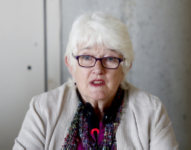 Nuala Mole, Senior Lawyer and founder of the AIRE Centre, expressed her satisfaction with the continuation of the project "Support to Strengthening Migration and Asylum Management in Serbia" because she believes that continuity is extremely important when addressing problems in this area.
Nuala Mole, Senior Lawyer and founder of the AIRE Centre, expressed her satisfaction with the continuation of the project "Support to Strengthening Migration and Asylum Management in Serbia" because she believes that continuity is extremely important when addressing problems in this area.
"The phenomenon of migration in Southeast Europe is continuously changing so it is crucial that local authorities, courts, non-governmental organizations and all other actors be aware of changes in regulations and standards. Only thus they will be able to respond to changes, and this Project and projects like this precisely serve to strengthening the capacities of all participants in the process.
The application of asylum standards in Serbia is limited by the fact that Serbia is not a member of the European Union, and Serbia is also specific in that there are not so many problems with the asylum procedure because it is not a closed state.
It should be noted that some of the most important and biggest changes in the legislative domain originate from the case law of the Luxembourg Court. Individual experiences and individual cases have been very useful for creating the regulations, standards and procedures, accompanied with continuous work on their implementation.
The most important thing is that we accept the existence of collective responsibility and the fact that we all together - local authorities, government authorities, courts, international organizations and non-governmental organizations - need to build a system that ensures protection of fundamental rights of asylum seekers. "
 Markela Papadouli, Europe Litigation Coordinator at AIRE Centre, co-author of the "Handbook on European Asylum and Migration Standards", with which an online course was prepared in the first phase of the project, announced a new edition of the handbook that builds on the foundations of the previous publication.
Markela Papadouli, Europe Litigation Coordinator at AIRE Centre, co-author of the "Handbook on European Asylum and Migration Standards", with which an online course was prepared in the first phase of the project, announced a new edition of the handbook that builds on the foundations of the previous publication.
"The new handbook, which has five chapters and four to five thematic units, deals with specific issues in the area of asylum and migration. It examines the rules and standards applicable to accelerated and border asylum procedures, special guarantees for vulnerable categories of asylum seekers, deprivation of liberty, expulsion and family reunification. In each chapter of the Handbook there is a review of the law of the Republic of Serbia and domestic standards related to individual topics. Reading the handbook is the first and most important step for all actors dealing with the issue of asylum and migration, because thus they will be able to make decisions and enforce laws in accordance with international and European standards on human rights protection. "
 Emilija Joksic, Head of the Asylum Office at the Ministry of the Interior of the Republic of Serbia, noted the importance of the project "Support to Strengthening Migration and Asylum Management in Serbia", reflected, above all, in raising standards in the normative part and alignment with EU regulations.
Emilija Joksic, Head of the Asylum Office at the Ministry of the Interior of the Republic of Serbia, noted the importance of the project "Support to Strengthening Migration and Asylum Management in Serbia", reflected, above all, in raising standards in the normative part and alignment with EU regulations.
"Serbia has a human approach to regular and irregular migrants, as well as to asylum seekers, although it consistently takes care of protecting its borders and preserving state security. Although no asylum system anywhere in the world is perfect, we are aiming for higher standards, in which the new Law on Asylum will help us. It has simplified procedures, consolidated and shortened stages in the asylum procedure, but this does not mean automatic increase in the number of asylum seekers.
Thanks to the project 'Support to Strengthening Migration and Asylum Management in Serbia', the quality of training is much better because we are guided by international standards. We shall further on continuously provide trainings to officers of the Asylum Office, seek solutions for combating trafficking in human beings and inhuman treatment, as well as provide special protection to the vulnerable categories. Our main goal is to raise quality and shorten the procedure for asylum seekers, whose number is not big at the moment, since the largest number of people entering the territory of the Republic of Serbia do not want to apply for asylum, or talk to us. "
Svetlana Velimirovic, Assistant Commissioner at the Commissariat for Refugees, speaking on the horizontal implementation of asylum and migration regulations, stressed the importance of good coordination and cooperation among all state authorities in charge of implementing the Law on Asylum and Temporary Protection.
"It is very important for us that procedural and reception guarantees will be easier to implement, first of all in terms of their financing. Also before, in spite of all, we had to ensure for these persons who are staying in Serbia respect for their fundamental rights arising from our Constitution - the right to accommodation, treatment, education ... They are now in a kind of legal limbo, and we hope that with the help of new legal solutions we will be able to move them into lawful legal flows. "
 Zorica Djokic Milosavljevic, former head of the Asylum Commission and newly appointed Assistant Head for Administrative Affairs, spoke about the challenges in applying novelties in the asylum procedure in the Republic of Serbia.
Zorica Djokic Milosavljevic, former head of the Asylum Commission and newly appointed Assistant Head for Administrative Affairs, spoke about the challenges in applying novelties in the asylum procedure in the Republic of Serbia.
"It's been exactly ten years since the passing of the last Asylum Law in Serbia, during which the circumstances and conditions have changed significantly. Today, when we have a new Law on Asylum and Temporary Protection, we are starting making plans for a new decade. In this regard, it is very important to develop numerous documents and by-laws, as no law should be selectively applied or ignored. Capacity building is our primary goal, both in terms of expanding the staff of Asylum Office, and in terms of greater efficiency of courts. "
Zorica Vulić, head of department at the Border Police Administration of the Ministry of the Interior of the Republic of Serbia, used her participation in the conference to highlight the importance of the new Law on Asylum and Temporary Protection and the Law on Foreigners, which will be applied starting from October this year.
"In the course of daily work, we shall observe possible deficiencies and we shall work towards their elimination. This phase of harmonization has been made through several directives to prevent uncontrolled migration movements, which is the goal of every state, including ours. Alignment was ensured with regard to the issue of humanitarian, independent and unlawful stay, evidence presented to competent police administrations, conditions to be met, procedures and guarantees..."
Marko Perovic, Coordinator for the Protection of Migrants from IOM Serbia, commended the solution for the voluntary return arising from the Law on Foreigners and the Law on Asylum and Temporary Protection.
"The whole migration management system should be made more effective, in which this Project will certainly help us, much the same as meetings like this conference, and new legal solutions, and a stronger cooperation among all actors. As regards voluntary assisted return, the prescribed deadlines will be the biggest challenge, but I believe that we will be able to solve this matter easier thanks to the agreed procedures. "
 Dušan Aralica, Associate Protection Officer at the UNHCR, moderator of panel discussion "Novelties in the Asylum Procedure and Challenges in their Application", regards that any alignment of domestic laws, regulations and standards with international regulations is bringing us closer to the European Union.
Dušan Aralica, Associate Protection Officer at the UNHCR, moderator of panel discussion "Novelties in the Asylum Procedure and Challenges in their Application", regards that any alignment of domestic laws, regulations and standards with international regulations is bringing us closer to the European Union.
"The continuation of the Project, including this conference, is one more important element in the process of capacity building of state institutions, primarily those dealing with asylum, and in the process of complying with the standards, which is our international obligation, and in the process of EU legal approximation. The IOM, which carries out this Project in cooperation with the British Embassy, the AIRE Centre and the UNHCR, has organized another very useful meeting for all participants, both those working with institutions as well as those from the civil sector. An important parts of the Project will be a new Handbook, that we look forward to, as a continuation of the last year’s publication, and an upgrading of the existing database. "
Ljubimka Mitrović, Security Officer at the UNHCR, expressed her satisfaction with the new standards and guarantees, especially in the area of protection of minors.
"Both laws constitute an important step forward and a good basis for improving the protection of the most vulnerable groups, to which unaccompanied minors certainly belong. We expect good cooperation and better coordination among competent state authorities, international organizations and civil society organizations, since more than 300 minors are staying in Serbia today. For us at UNHCR, it is especially important to make a special assessment for each case and to protect the interest of each individual child. This will, among other things, be achieved by the new Law on Asylum and Temporary Protection which prescribes an individualized assessment for accommodation ".
The project "Support to Strengthening Migration and Asylum Management in Serbia" was developed as a response to 2015 migrant crisis in the Western Balkans region, which pointed to the need for further reform and the establishment of a more efficient migration and asylum management system in the Republic of Serbia.






